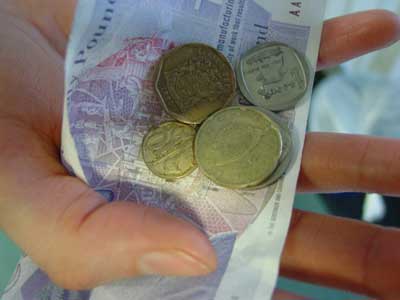Talking point: Tipping
Being a British business traveller in a foreign restaurant can be a minefield of mortification when it comes to paying the bill and struggling to work out what gratuity to leave. Gerard Gilbert finds out how generous you should be

Your support helps us to tell the story
From reproductive rights to climate change to Big Tech, The Independent is on the ground when the story is developing. Whether it's investigating the financials of Elon Musk's pro-Trump PAC or producing our latest documentary, 'The A Word', which shines a light on the American women fighting for reproductive rights, we know how important it is to parse out the facts from the messaging.
At such a critical moment in US history, we need reporters on the ground. Your donation allows us to keep sending journalists to speak to both sides of the story.
The Independent is trusted by Americans across the entire political spectrum. And unlike many other quality news outlets, we choose not to lock Americans out of our reporting and analysis with paywalls. We believe quality journalism should be available to everyone, paid for by those who can afford it.
Your support makes all the difference.The tip. It's such a small word. But this tiny yet open-ended call on our wallets causes more perplexity than any other aspect of foreign travel.
Tipping is a jungle of unspoken rules and potential offence, and a one-way ticket to humiliation. In fact the only people as easily embarrassed as the British are the Japanese; at home at least, they have got round the problem by not tipping at all.
"It is neither expected or required," says a spokesman for the Japanese National Tourist Office. "Not even leaving a few coins. The only possible exception is when staying in Japanese-style accommodation and a maid has been assigned to you for your stay. It's common then to give her a modest tip at the end of your stay."
Meanwhile Australia, too, is essentially a non-tipping country and tipping is equally uncustomary in New Zealand.
In Singapore, that bastion of social authoritarianism, tipping is actively discouraged - and is downright forbidden at the airport. The government feels tipping encourages bad behaviour and corruption. It's not unusual in Singapore for people to refuse a tip, and tell you proudly that "we don't tip here". But in upmarket restaurants a 10 per cent service charge is usually added to the bill.
India is altogether less clear cut. At Bombay airport, there are porters wearing T-shirts that read "No Tipping". But, says Peter Popham, The Independent's former India correspondent, "this is the authorities trying to put their finger in the dyke. Porters charge outrageous sums and tipping is still the norm." India, in general, runs on tips - right down to shopkeepers who help take your shopping to your car.
Everybody likes to receive a gratuity, but in Italy they don't expect one from strangers. In fact, according to Peter Popham (now our man in Rome), they'd think you were a moron: "An amiable moron, but a moron all the same," he says. "The Italian attitude is ‘what is the point of giving money to a stranger?' So they don't expect it from strangers themselves." So what sort of tip do Italians leave in restaurants? "A bit of small change," says Popham. "One per cent, if that. You certainly wouldn't leave 10 per cent to a waiter."
Greece is another country that doesn't go in for tipping in a big way. " If you're in a big party – a wedding celebration for example - you wouldn't pay any more than the equivalent of £7 for everyone," says our man in Athens, Daniel Howden. "It's not like in England where you'd be expected to tip 10 per cent of the bill however large it is."
And France? The French word for tip is pourboire - literally "for a drink" which tells you a lot about the origins of tipping in France, if little about current practice. A 15 per cent service charge is automatically included in the prices on nearly all restaurant menus in France (that's what "service compris" means at the bottom of the bill), so tipping is entirely discretionary. John Lichfield, The Independent's Paris correspondent, says that to show your appreciation of good service, you might leave a couple of euros.
The Cornell University School of Hotel Management undertook research into the psychology of tipping, looking at different customs in different countries, counting the number of service professions that were tipped. The academics then compared these results with the aggregated results of personality tests taken by people in these countries. It turned out that countries with the most extrovert and neurotic citizens tipped the largest amounts and to the greatest number of professions. Leading the field by distance: the United States, of course.
The American catering trade runs on tips. Some staff are paid minimum wages, though those who are working illegally may depend entirely on their share of tips. In a bar, you are going to have a miserable evening unless you slip the bartender or cocktail waitress a dollar or two with every round. On meal bills, you are expected to tip a minimum of 15 per cent, though 20 or even 25 per cent are not uncommon. And if you don't want to tip in the USA? Expect a fuss from a furious server. Not tipping is seen as a highly significant social statement, akin to refusing to pay the due amount.
Join our commenting forum
Join thought-provoking conversations, follow other Independent readers and see their replies
Comments